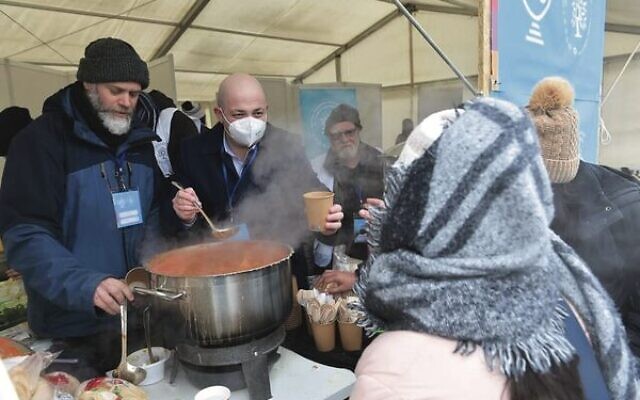When the communal calendar shouldn’t count
In times of crisis, shouldn't we all be banding together?

WE are a stiff-necked, opinionated and internally divisive people. It is no coincidence that as far back as the times of Moshe Rabbeinu, he described us as “am k’sheh oref”… a stiff-necked people.
Jews are not inherently agreeable as evidenced from the very nature of our halachah, Jewish law.
We argue with each other … rabbinic sage with rabbinic sage, halachic discourse, political divisiveness, and even which charity we should support.
Does charity begin at home, or with Israel or with Jews in need overseas?
Indeed, just in the past week we have seen two of our non-profits issuing emergency appeals for the benefit of isolated Ukrainian Jews and those fleeing their homes – The Joint (JDC) and the United Israel Appeal (UIA), the Australian fundraising arm of the Jewish Agency.
The functions of these organisations are radically different.
For over 100 years, The Joint has worked tirelessly to assist Jewish communities in need around the world, including Israel.
When my parents z’l met in a displaced persons camp in Foerenwald, Germany in 1946, the roof over their heads, the food they ate and the clothes they wore were provided by The Joint.
When they attempted to travel to Palestine in 1947 their ship, the Exodus, was bought, staffed, and supplied by The Joint.
The Jewish Agency was also involved in their care. My father used to tell us with his customary inexplicably sourced humour, how the Jewish Agency (Sochnut) representative in Foerenwald warned the prospective emigrants to Israel that the Hungarians would never properly pronounce Hebrew!
In those times, both the Jewish Agency and The Joint were collaboratively working towards the almost impossible task of rehabilitation and resettlement of the remnants of European Jewry.
It is estimated that there are over 200,000 Jews in the Ukraine of whom some 45,000 are “halachically Jewish”. These are the figures I have taken from Israeli news sources although they are impossible to independently verify.
When first promulgated the Israeli Law of Return defined a Jew as an individual with a Jewish mother. In 1971, the Law of Return was changed to define a “Jew” as a person with one Jewish grandparent.
The one million Russian refugees who emigrated to Israel since the 1970s did so based on the assertion of least one Jewish grandparent, often evidenced by anecdotal memories of lighting candles or observing Yom Kippur.
The rabbinate (and the Rebbe) was deeply troubled by this redefinition of a halachic requirement, but humanitarian concerns outweighed definitional and evidentiary challenges.
As we speak the Jewish Agency has sent a number of staff members to the Ukrainian borders. Their purpose is to assist Ukrainian Jews, as defined by the current Law of Return, in making aliyah. Although there is an inevitable probative issue, the Jewish Agency has stated that those issues will be postponed until their arrival in Israel.
As I write, one planeload of Ukrainians seeking to make aliyah have landed in Israel with another scheduled to arrive this week.
The Joint, meanwhile, has 6000 workers within Ukraine, on the borders, and at Jewish community centres in Polish cities.
Unfortunately, Vladimir Putin didn’t consult with the communal calendar, and his brutal invasion and bombardment of Ukraine coincided with UIA appeal time.
The calendar is designed to ensure all organisations get a fair crack at fundraising throughout the year without one encroaching on the other.
But, as I understand it, that does not allow for exceptional circumstances such as we are witnessing in Ukraine.
In an ideal world, the two would work collaboratively in conducting emergency appeals in these weeks of crisis.
Those who are Israel-focused would be encouraged to donate to the UIA and others would, likewise, be encouraged to donate to The Joint.
Most of us might need to prioritise our charity funds as we could not give to both.
However, we would recognise that exceptional times demand exceptional measures. After all, it is a moral duty to help all Jews in distress whether or not they aim to make aliyah.
That being the case, we shouldn’t feel bound to donate to one organisation over the other. Which is why, despite the calendar, I will be honouring those who sheltered my parents and thousands of other refugees by donating to The Joint Australia.
Deborah Huber is a Sydney/Tel Aviv-based lawyer and author.

comments